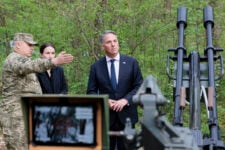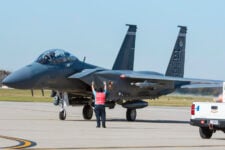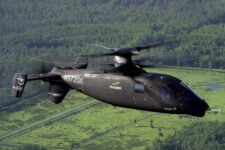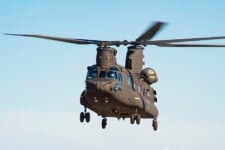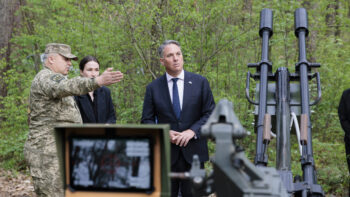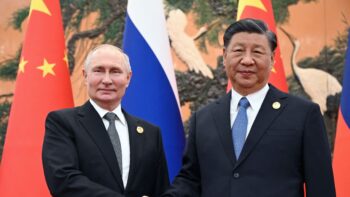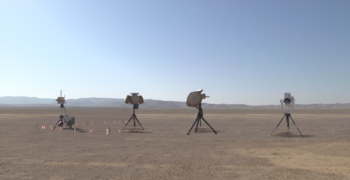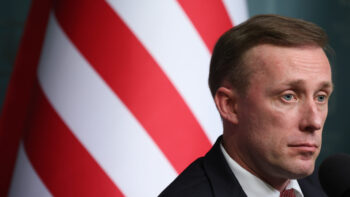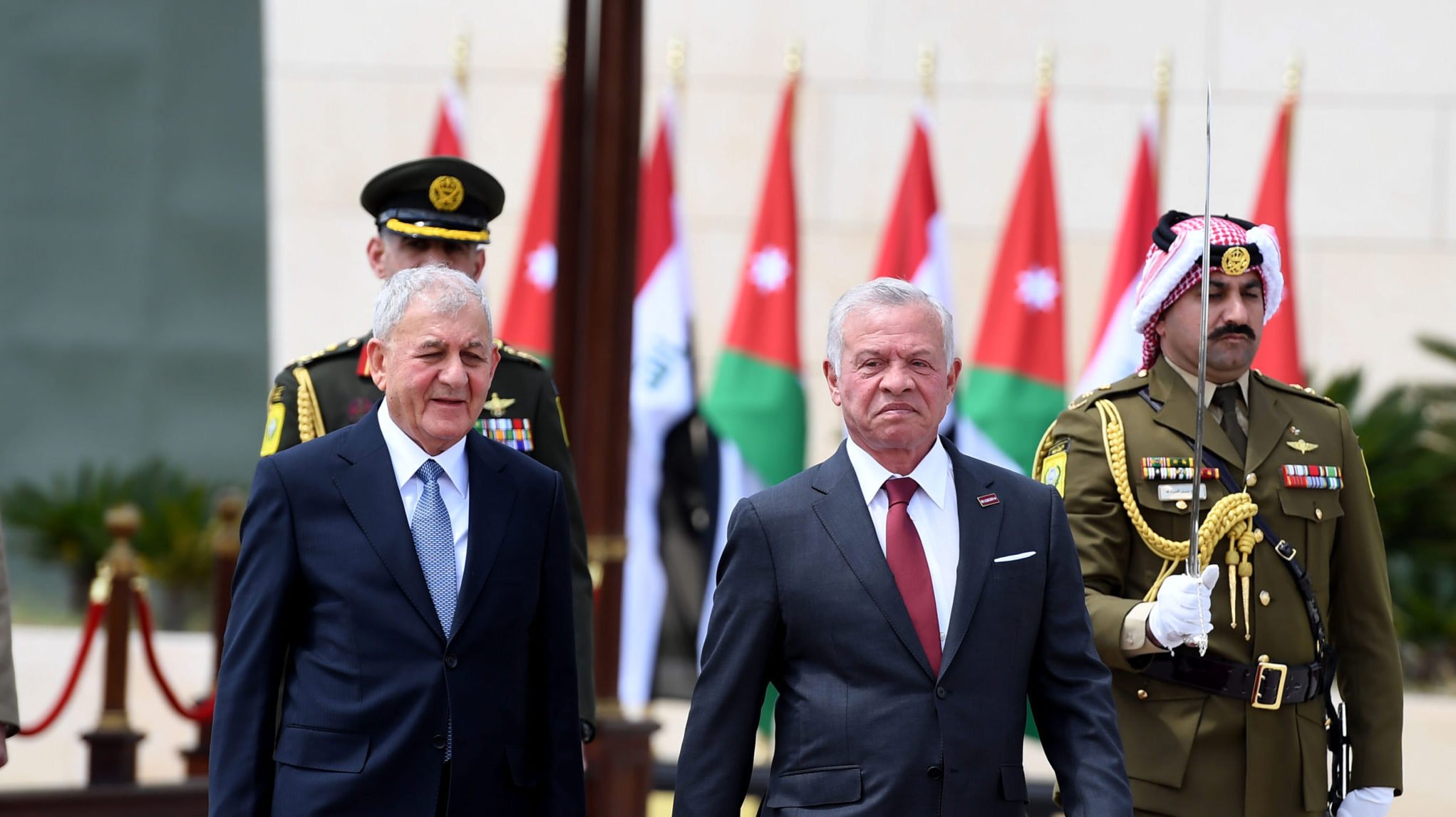
King Abdullah II of Jordan (2nd R) welcomes Iraqi President Abdul Latif Rashid (2nd L) at Marka International Airport in Amman, Jordan on April 15, 2024. (Photo by Iraqi Presidency / Handout/Anadolu via Getty Images)
BEIRUT — The king of Jordan today defended his military’s actions over the weekend in apparently intercepting some of the Iranian missiles and drones that overflew Jordanian airspace on their way to targets in Israel, saying his lands will not be a “theater of war” for any side.
The security of the nation, and the protection of its citizens, comes above all other considerations, King Abdullah II said, according to Jordan’s state news agency.
In the hours after the unprecedented barrage of missiles and drones launched by Iran towards Israel, the government of Jordan, which lies directly between the two Middle East enemies, said on Sunday it had intercepted “foreign objects in Jordanian airspace” and said “fragments” from the interceptions fell in “various locations” but caused no significant damage. (Reuters reported Jordian air force jets conducted some interceptions.)
His Majesty King Abdullah II says #Jordan will not be a battlefield for any party, and the protection of Jordanians comes above all else
— RHC (@RHCJO) April 16, 2024
And while Amman’s friends in Washington, DC, likely praised the intervention, it has put Jordan in a delicate position, as ever since, Iran and others have seized on the interceptions as evidence that the monarchy has turned on the Palestinian cause in favor of its de facto protection of Jerusalem.
“Jordanian leaders have been very clear to portray their action as defensive and in protection of their own sovereignty rather than any act in support of Israel, and this is sincere, as is the message from Amman that the Iranian strikes on Israel must not be allowed to draw attention away from Gaza,” Kristian Coates Ulrichsen, fellow for the Middle East at Rice University’s Baker Institute told Breaking Defense.
Ulrichsen suggested Iraq also could have intercepted munitions that overflew its airspace but chose not to due to “political dynamics.” Iraqi Prime Minister Mohammed Shia al-Sudani was on his way to the White House in the hours after the attack. (Missiles and drones are believed to have traversed Syrian and Lebanese airspace as well, but Syria is closely aligned with Iran and much of Lebanon is controlled by Hezbollah, an Iranian proxy group.)
Abdullah Al Junaid, a Bahraini strategic expert and political researcher, said that “every state has the right to protect the safety and security of its sovereign airspace, and the measures taken by Jordan were the expected ones. That baseless accusations of Jordan protecting Israel airspace is in line with the Iranian narrative, while it is Iran and its regional proxies that infringe regional security and stability.”
Still, the Jordanian government appears cognizant of the criticism that it acted when other Arab nations did not. Today Communications Minister Muhannad Mubaideen emphasized, “We are not abandoning our Arab and Islamic tasks and roles, and Jordan’s positions are honorable and its Hashemite leadership has been defending the Palestinian cause for more than a century.”
Jordan’s Foreign Affairs Minister Ayman Safadi said on Sunday that the Kingdom would’ve reacted the same way had the drones been from Israel, “and this is a position we affirm clearly and explicitly, and we will not allow anyone to jeopardize the security of Jordan and Jordanians.”
In the view of Jonathan Lord, director of the Middle East security program at the Center for a New American Security, the situation is complicated by the reality of the benefits Jordan is seeing from its more friendly relationship with the US and Israel, with whom it has had normalized relations since the 1990s.
“Jordan’s participation in the defense of Israel demonstrates that while Amman needs to navigate the Israeli-Palestinian conflict sensitively, it is both broadly and closely aligned with US and Israeli regional security interests,” he said.
Jordan has not said exactly how it shot down the Iranian drones and missiles, but Lord surmised US-made systems were likely used and that their use “showcased to swing states in the region and throughout the world how they might stand to benefit themselves from a closer security relationship with Washington.” (After the Gaza conflict broke out in October 2023, Jordan requested the US to deploy patriot air defense systems to secure its borders.)
He added that while Abdullah and Israeli Prime Minister Benjamin Netanyahu “may sharply diverge over the question of Palestinian ambitions for statehood, they share a deeply-rooted common interest in preventing Iran from projecting violence and instability through the region.”
In the wake of the attack there’s been a flurry of diplomatic activity, as the US and regional powers look to deescalate the situation. On Monday, the same day Iraq’s al-Sudani met with Biden at the White House, Jordan’s Abdullah hosted Iraqi President Abdul Latif Rashid in Amman.
Before both those meetings, however, Biden called Abdullah and, according to the White House, the US president “strongly condemned the attack launched by Iran that also threatened Jordan and the Jordanian people.”
The two “noted that they continue to monitor the situation and will remain in close touch over the coming days.”
Australia tops up Ukraine military aid with $100M
Australia has already supplied Ukraine with 120 Bushmaster vehicles, six 155mm howitzers, 56 M113 armored vehicles, 14 special operations vehicles and its signature cardboard drones.
